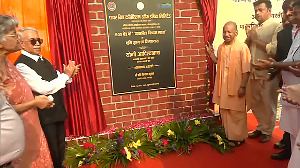The four major earthquakes in the past one year, including the one that triggered the tsunami, were due to the seismic activity in the same plate boundary, but there was no link amongst them, the Indian Meteorological Department said Wednesday.
"The plate boundary between Indian and Eurasian plates is known to be sensitive for earthquakes," Dr A K Shukla, director at the IMD's Earthquake Risk Evaluation Centre, said. Fault zones in this plate boundary are already defined, he said. Chamoli in Uttaranchal, where Wednesday's earthquake was epicentered, falls under zone V, which is seismically the most active region of the country.
The Kashmir valley also falls in this zone, he said. Strain has been accumulating in the plate boundary that extends from Andamans to Himalayan region of India, called the Alpine belt, he said adding the last year's December 26 earthquake was also the result of seismic activity in the same plate.
"However, all these earthquakes are totally indpendent," he said. When asked whether the frequency of quakes had increased in this plate boundary, he said it was just a coincidence that major quakes have occurred in about a year.
"But quakes keep happening," he said.







 © 2025
© 2025